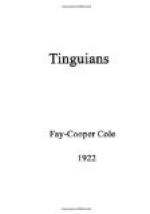The wife may bring a charge of cruelty or laziness against her husband, and if it is substantiated, he will be compelled to complete the marriage agreement and give the woman her freedom. Unfaithfulness on the part of a wife, or a betrothed girl, justifies the aggrieved in killing one or both of the offenders. He may, however, be satisfied by having the marriage gift returned to him, together with a fine and a decree of divorce.
A man who has a child by an unmarried woman, not a pota, must give the girl’s people about one hundred pesos, and must support the infant. Later the child comes into his keeping, and is recognized as an heir to his estate.
Marriage is prohibited between cousins, between a man and his adopted sister, his sister-in-law, or mother-in-law. Union with a second cousin is also tabooed. It is said that offenders would be cut off from the village; no one would associate with them, and their children would be disinherited.
A widow may remarry after the Layog ceremony (cf. p. 290), but all the property of her first husband goes to his children.
If a wife has neglected her husband during his final illness, she may be compelled to remain under two blankets, while the body is in the house (cf. p. 286), unless she pays a fine of ten or fifteen pesos to his family.
Children must care for and support infirm parents. Should there be no children, this duty falls upon the nearest relative.
Inheritance.—Although a price is paid for the bride, the Tinguian woman is in no sense a slave. She may inherit property from her parents, hold it through life, and pass it on to her children.
Following the death of a man, enough is taken from his estate to pay up any part of the marriage agreement which may still be due, and the balance is divided among his children. If there are no children, it is probable that his personal possessions will go to his father or mother, if they are still living; otherwise, to his brothers and sisters. However, the old men in council may decide that the wife is entitled to a share. Should she remarry and bear children to her second husband, she cannot give any part of this property to them, but upon her death it goes to the offspring of the first marriage, or reverts to the relatives. Land is divided about equally between boys and girls, but the boys receive the major part of the animals, and the girls their mother’s beads. Oftentimes the old men will give the oldest child the largest share, “since he has helped his parents longest.”
Whatever the husband and wife have accumulated in common during their married life is divided, and the man’s portion is disposed of, as just indicated. Illegitimate children and those of a pota receive a share of their father’s property, but not in the same proportion as the children of the wife. No part of the estate goes to a concubine unless, in the judgment of the old men, it is necessary to provide for her, because of sickness or infirmity.




